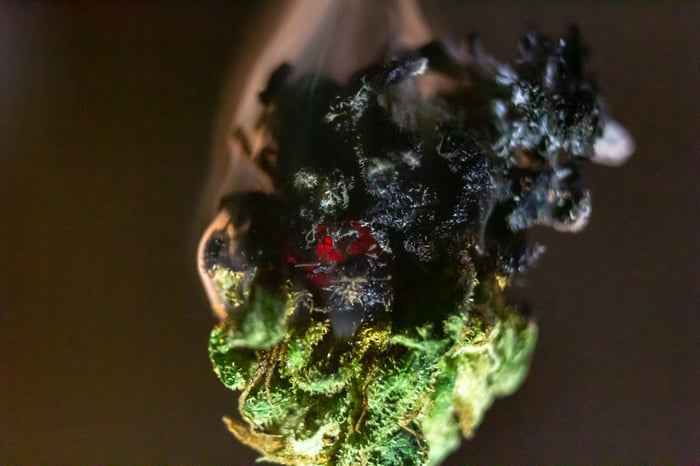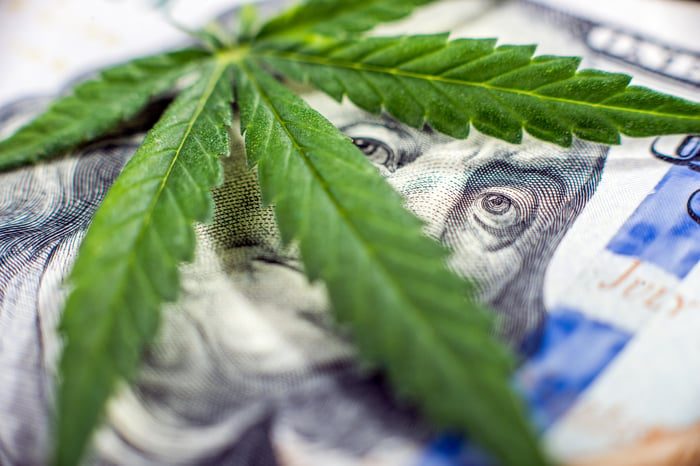Could Aurora Cannabis fall below $1 in 2020?

In just a matter of days, we'll be closing the curtain on 2019, which turned out to be an incredibly good year for the broad-based markets, and an abysmal year for marijuana stock investors.
Everything began well, with cannabis stocks leading the charge throughout the first quarter. But the wheels, and everything else that wasn't welded on, soon fell off the wagon. Persistent supply issues throughout Canada, high tax rates in a number of recreationally legal U.S. states, and a resilient black market have made investing in pot stocks particularly painful in 2019.
For example, the most popular stock on online investing platform Robinhood, Aurora Cannabis (NYSE:ACB), has shed 80% of its value since peaking in mid-March. And note, I don't mean most popular pot stock -- I mean the most-held stock, period, on the entire platform. At just $2 a share, the company probably looks like a bargain to the nearly 10% of Robinhood members who currently own it.
But looks can be deceiving, and while it might sound far-fetched, Aurora Cannabis' stock could fall another 50% in 2020 and potentially dip below $1 a share.
Everything looked perfect for Aurora Cannabis...
On paper, at least, Aurora Cannabis looks like it has its ducks in a row. No grower has more peak production capacity, with 15 cultivation facilities capable of probably close to 700,000 kilos per year. These large growing campuses are also capable of yielding more per square foot than the industry average, which, when coupled with its size, would be expected to push per-gram production costs well below the industry average.
Aurora also has a clear lead when it comes to international expansion efforts. Including Canada, it has a presence -- be it in cultivation, research, export, or a partnership -- in 25 countries. Only two of its peers are even at or above one dozen countries. The thinking had been that if and when Canadian dried cannabis flower became oversupplied, Aurora would simply lean on these foreign sales channels, where higher-margin medical marijuana is legal, to offload its excess supply.
This is also a company that brought in famed billionaire activist investor Nelson Peltz as a strategic adviser in mid-March. It was no secret that Aurora was looking for an equity investment and/or brand-name partnership with a company in the food or beverages industry to help with the forthcoming launch of derivatives (i.e., edibles, infused beverages, vapes, topicals, tinctures, and concentrates). Peltz's background as an activist investor happens to focus on the food and beverage industry, making him the perfect person to bridge an eventual partnership or equity investment.
But estimates and projections don't always lead to concrete results, as we've witnessed with Aurora Cannabis.

...Then it all fell apart
As you're likely well aware, one of the main issues that's hurt all Canadian growers is the inability to get product in front of consumers. The government agency Health Canada is partly to blame for delaying the rollout of high-margin derivatives by two months, as well as contending with an enormous backlog of licensing applications, thereby leading to long wait times to plant and sell cannabis. But a lot of the finger-pointing is directed at Ontario, which had a meager 24 dispensaries open on the one-year anniversary of the legalization of recreational weed sales. A change in Ontario's dispensary licensing policy should help, but there's no immediate relief for the most-populous province's supply concerns.
The problem is that there are also company-specific issues beyond just getting its products in front of the consumer. For example, Aurora Cannabis' aggressive expansion tactics, which included more than a dozen acquisitions over the course of three years, are hurting shareholders two ways.
First, the company financed practically all of its deals, as well as its ongoing operations, by issuing common stock or, in rarer instances, convertible debentures. By using its stock as capital, Aurora has ballooned its outstanding share count from 16 million to close to 1.1 billion in a little over five years. No matter what sort of assets are added, it's virtually impossible for shareholders to contend with this level of dilution without being hammered.
Second, Aurora's aggressive acquisition strategy looks to have led to a number of gross overpayments for the companies that were purchased. Given the various U.S. deals that have been amended or canceled in recent months, perhaps it's no surprise that Aurora is carrying around $3.17 billion in Canadian dollars ($2.4 billion) in goodwill (i.e., premiums paid above and beyond tangible assets) on its balance sheet. Sure, Aurora may have CA$5.6 billion in total assets, but 57% of this is made up of goodwill, and 69% as a whole from goodwill plus intangible assets. In other words, Aurora's value proposition is built on finger-crossing and hope, which may ultimately not work in investors' favor.

Yes, Aurora Cannabis could fall below $1 in 2020
While it's always possible that Canada corrects its supply issues quicker than anticipated, Aurora looks to be on a slippery slope that could have its share price fall below $1. Note that with close to 1.1 billion shares outstanding, this would still give the company a roughly $1 billion market cap.
Following the recently announced departure of chief corporate officer Cam Battley (Battley was, arguably, Aurora's primary cheerleader), Aurora can now add executive turnover and uncertainty to its growing mix of concerns. In 2020, it certainly wouldn't take much to shave another $1 off the share price of a company that Wall Street doesn't seem to trust at the moment.
But what would be the ultimate culprit that drags Aurora below $1 a share, you wonder? My best guess would be a significant writedown on the value of its goodwill. We witnessed Aphria get roasted after taking a CA$50 million charge on its Latin American asset purchase, albeit there were other concerns surrounding this transaction in the first place. Still, if Aurora was forced to write down even a third of its goodwill, the company's stock could be clobbered.
Another possible reason for a decline below $1 might be financing concerns. Aurora does have $400 million (those are U.S. dollars) in at-the-market financing available, which is a fancy way of saying it could potentially bury shareholders under a sea of new common-stock issuances to bolster its cash position as losses mount.
The point is that the negatives clearly outnumber the positives right now, and Aurora's already beaten-down stock could still head much lower.
420 Intel is Your Source for Marijuana News
420 Intel Canada is your leading news source for the Canadian cannabis industry. Get the latest updates on Canadian cannabis stocks and developments on how Canada continues to be a major player in the worldwide recreational and medical cannabis industry.
420 Intel Canada is the Canadian Industry news outlet that will keep you updated on how these Canadian developments in recreational and medical marijuana will impact the country and the world. Our commitment is to bring you the most important cannabis news stories from across Canada every day of the week.
Marijuana industry news is a constant endeavor with new developments each day. For marijuana news across the True North, 420 Intel Canada promises to bring you quality, Canadian, cannabis industry news.
You can get 420 Intel news delivered directly to your inbox by signing up for our daily marijuana news, ensuring you’re always kept up to date on the ever-changing cannabis industry. To stay even better informed about marijuana legalization news follow us on Twitter, Facebook and LinkedIn.




